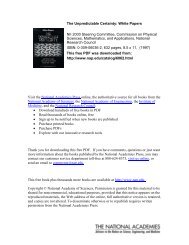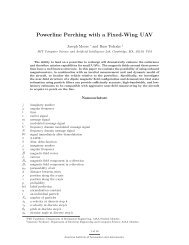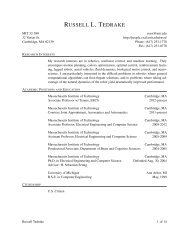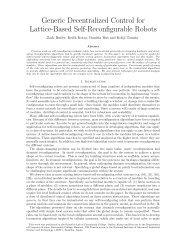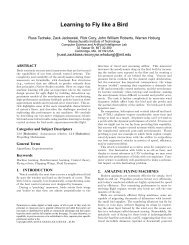Online Social Networks and E-Commerce - MIT Computer Science ...
Online Social Networks and E-Commerce - MIT Computer Science ...
Online Social Networks and E-Commerce - MIT Computer Science ...
You also want an ePaper? Increase the reach of your titles
YUMPU automatically turns print PDFs into web optimized ePapers that Google loves.
Clarence Lee <strong>and</strong> Shirley Fung<br />
was done, like in this scenario, consumers may not even know why their insurance premiums were<br />
increased.<br />
Proposing a Blanket Privacy Policy Protecting <strong>Online</strong> Data from<br />
Government Intrusion<br />
As described in the previous sections, there are several issues with the status quo. The proposal to have a<br />
blanket privacy policy is to prevent further government intrusions on privacy over online data <strong>and</strong><br />
communications. In addition, a simpler policy will be easier for citizens to underst<strong>and</strong>. All online data <strong>and</strong><br />
communications should be treated equally under this new policy.<br />
Policy Analysis<br />
A blanket policy will aim to ensure that all online communications <strong>and</strong> data stored by third parties to be<br />
protected under a high level of protection against the government. In order for the government to obtain<br />
information such as all email or internet logs, a warrant issued on a high probable cause needs to be<br />
required. In doing so, government officials need to meet a higher st<strong>and</strong>ard of proof for how this<br />
information is relevant to the current investigation.<br />
It is clear that there is an intrusion of privacy when the government would like to get their h<strong>and</strong>s on data<br />
on these Web sites, but it is unclear why different kinds of data are protected under different levels of<br />
protection. It is illustrated in this paper that the electronic communications stored on various online<br />
services providers are all information that can reveal a lot of sensitive information about individuals.<br />
As more kinds of activities arose on the Internet, policy makers <strong>and</strong> court rulings have been creating<br />
patchwork to determine what kind of data should be covered under which kind of privacy protection.<br />
What they have failed to realize is that all the different kinds of information can provide a lot of<br />
information about an individual. Consequently, data protected under a lower st<strong>and</strong>ard, became loopholes<br />
in our legal system for electronic surveillance. This opens up areas where investigators can deduce similar<br />
information using information such as internet logs, which can be easily obtained with a court order.<br />
Having a blanket policy protection will protect all online activities as a whole, so that it would provide a<br />
more comprehensive protection on our privacy. It would effectively remove artificial exceptions such as<br />
whether an email was opened or unopened, or whether the email was 180 days old or not. Such a policy<br />
would be easier to underst<strong>and</strong> <strong>and</strong> enforce. As technology evolves, we may expect that other kinds of data<br />
would be used <strong>and</strong> stored by third parties. A blanket policy would be advantageous because it would<br />
continue to cover new kinds of online records.<br />
Page 28




![[ti]The “Vulgar Spirit of Blogging”: On Language, Culture ... - CSAIL](https://img.yumpu.com/18604217/1/190x245/tithe-vulgar-spirit-of-blogging-on-language-culture-csail.jpg?quality=85)




